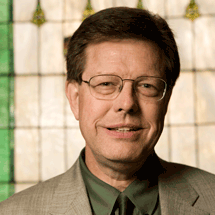 |
intersect
Look UP in the Downturn
INTERSECT (Where the Bible Meets Life) is a regular column of ONE Magazine featuring Dr. Garnett Reid, a member of the Bible faculty at Free Will Baptist Bible College. Email Garnett greid@fwbbc.edu |
Imagine a global economic empire enriching the whole world—a national corporate giant trading a vast array of commodities at huge profit margins.
Then it all crashes and burns. The reason? The nation’s “heart had become proud in their wealth.” Read the entire episode in Ezekiel 26 and 27. The nation is Phoenicia, the city Tyre, ancient equivalent of the “Big Apple.”
But it might have been us—the United States, I mean, in the aftermath of the recent economic collapse.
Full Pockets, Empty Plates
Whatever the case with our nation’s money woes, even more alarming is the Church’s economy. Greed is sweeping through our congregations, leaving collection plates as empty as a fried chicken platter after a potluck dinner. Though disposable income quadrupled in the 20th century, American Christians continue to give less and less.
Recently, I heard a pastor tell his people he was hesitant to talk about money with them. But talk about it pastors must! Can you imagine a minister not wanting to preach about prayer or evangelism? Yet Scriptures devotes just as much attention to the subject of finances.
During Jesus’ Samaritan ministry recorded in Luke 9-19, He spoke of money some 55 times. He referred to riches, treasure, coins, property, bills, possessions, wealth, tithes, buying, selling, fraud, banks, interest, and poverty. When the living Word and the written Word offer so much counsel, we should be all ears!
Let me suggest five financial challenges:
First, radically re-frame your view of wealth. Don’t let yourself off the hook until you believe with all your heart that it all belongs to God (1 Chronicles 29:16).
Next, see greed for what it really is—a threat to your faith. According to Jesus, wealth tries to be like God (Matthew 6:24). We think that we use it, but in reality it uses us. It will not stop until it has taken control of all we are, and we may never realize its subtle influence.
Admit conflict over what matters most in life—love. Love is nothing unless it consumes us. Our very being melds with what we love, and we cannot love God if we love our wealth. Loving money really means hating God (1 Timothy 6:10).
The fourth step is to align our hearts with the lavish claims of grace. The sad truth about wealth is that it is contrary to the very nature of grace. God always “gives” (Romans 8:32), but we never give when greed is our god. As Jacques Ellul advises, we must make money profane; take away all its power in our lives, and the best way to do that is to give with abandon.
Finally, make the hard choices. Look at what you have, not what you don’t have. Relearn contentment. Serve people, not money. Receive what you get with gratitude. Use what God gives you for His kingdom. Give away what you don’t need, and celebrate grace even in the bondage of recession.
|

